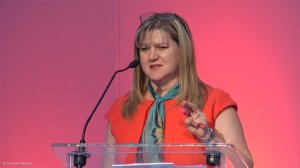In a frank address to the Smart Procurement World conference, on Monday, National Treasury chief director of strategic procurement in the office of the chief procurement officer Estelle Setan acknowledged the shortcomings of government’s existing public procurement processes, noting that her office was challenging public procurement realities in response to increasing pressure from the public, the Finance Minister and the Auditor General.
“Change is going to happen in procurement in the public sector. We are looking at our strategies and how we use the supply chain, as supply chain management has been identified by the Auditor General as one of six key risk areas [in government]. We can do better,” she commented.
The fragmented and decentralised nature of public procurement, the duplication of procurement efforts and an inconsistency between the pricing of goods and services offered to the public sector and private sector were identified as some of the key issues facing government in this regard.
“There is also a lack of policy direction and certainty, as well as a lack of standardisation around common goods procured by government throughout the country, such as school desks.
“This gives us less control on monitoring and opens the door for corruption. [As government], we’re not using our buying power properly,” she said.
Moreover, 82% of the State’s contract purchases were for amounts less than R30 000.
“I don’t think that’s smart [procurement],” she maintained.
Setan believed the introduction of so-called strategic sourcing within national and provincial government’s procurement practises would improve the quality of commodities and services secured by the State and its institutions and reduce government’s budget, which exceeded R1-trillion – R136-billion of which was spent on securing goods, services, machinery and equipment.
Noting that “only a fraction” of government institutions currently implemented strategic procurement, she outlined that this strategy involved a collaborative and structured process of critically analysing an organisation’s spending and using this information to make decisions about the acquisition of commodities and services.
This would drive efficiencies by creating “commodity expertise” within government, improve vendor performance and support government objectives, such as those contained within the National Development Plan.
“[Central to this] is the need for [public sector procurement officers] to become experts in the field in which [they are] procuring,” she noted.
In government’s traditional procurement model, very little time was spent on procurement planning, creating unnecessary complications during the tender awarding process, the contracting and the contract management processes.
In contrast, strategic procurement placed greater emphasis on upfront analysis and research prior to a tender being awarded, so that those within government tasked with awarding the contract had in-depth knowledge of the product and industry prior to approaching the market.
“Then it’s smooth sailing during the tender process, and [government] spends less time sorting out issues,” Setan outlined.
Noting that government currently “tended to buy everything in the same way”, she further advocated a differentiated approach to public procurement, in which different sourcing approaches were adopted for various products and services.
Setan added that there were three types of procurement within government, each of which required a differentiated approach.
Universal strategic procurement referred to the procurement of goods and services that were common across government departments and institutions, such as the payment for travel and accommodation.
Department-specific sourcing entailed the procurement of goods and services that were core to the key service delivery objectives of a specific department, such as buying medical supplies for the Department of Health and textbooks for the Department of Education.
Sector-specific procurement, meanwhile, referred to the acquisition of goods and services that affected more than one government department.
The adoption of this differentiated procurement approach was, however, complicated by the regulatory environment governing this practise, which Stellenbosch University law professor Geo Quinot believed had resulted in “extreme fragmentation” and a “disaster” scenario for standardised procurement.
“A [troublesome] aspect of the regulatory regime is that [government] is unable to develop over-arching strategies across various departments. We must revisit the basic structure of regulatory systems and make them more streamlined,” he argued.
EMAIL THIS ARTICLE SAVE THIS ARTICLE
To subscribe email subscriptions@creamermedia.co.za or click here
To advertise email advertising@creamermedia.co.za or click here










